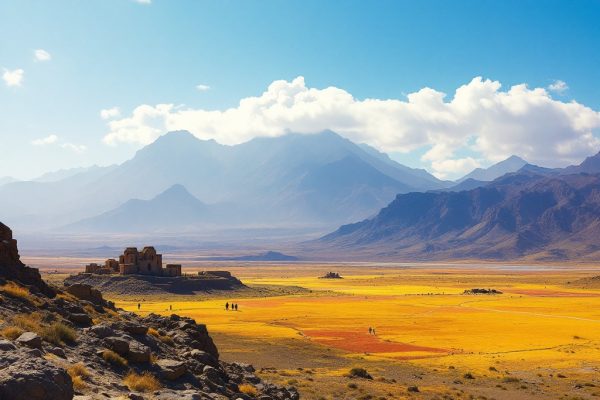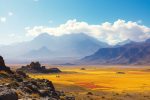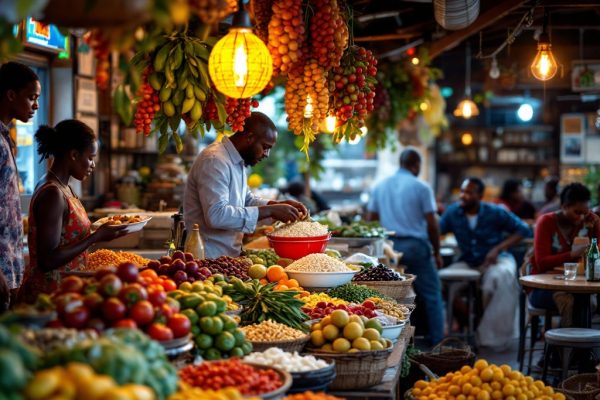African Travel Essentials: What to Remember About During Your Trip
Dreaming of an African adventure? From stunning safaris to vibrant cityscapes, this guide equips you with essential knowledge for a smooth trip. Discover key packing tips, including vital health precautions like necessary vaccinations and malaria prevention. Learn about respecting local customs, navigating cultural nuances, and essential gear for various activities. Prepare for an unforgettable journey by exploring our comprehensive guide now!
Important information

- Ensure your passport and visa are valid, and obtain necessary vaccinations like yellow fever.
- Pack light, breathable clothing in neutral colors, along with sturdy walking shoes, a hat, sunglasses, sunscreen, and insect repellent.
- Bring a first-aid kit with essential medications, a reusable water bottle, a portable charger, and a travel adapter.
- Respect local customs by dressing modestly, especially in religious sites or rural communities. Learn basic greetings.
- Protect your documents and money by making digital copies and informing your bank of your travel dates.
African Travel Essentials: What You Need to Know
Planning an African safari? Here’s your essential checklist:
Documents and Health
- Ensure your passport and visa are valid and up-to-date.
- Secure comprehensive travel insurance.
- Obtain necessary vaccination certificates (e.g., yellow fever).
Clothing and Essentials
- Pack light, breathable clothing suitable for warm weather and potential colder evenings.
- Choose comfortable and durable walking shoes.
- Bring a hat, sunglasses, sunscreen, and insect repellent for sun and insect protection.
- Prepare a first-aid kit and pack any necessary personal medications.
Tech and Gear
- Stay hydrated with a reusable water bottle.
- Keep your devices powered with a portable charger.
- Bring a camera to capture stunning wildlife.
- Enhance your viewing with binoculars.
Safety First
- Stay aware of your surroundings and secure your belongings.
- Follow local safety guidelines.
- Register with your embassy upon arrival.
- Keep emergency contacts easily accessible.
Have a fantastic trip!
Understanding Africa’s Climate
When preparing for your African adventure, remember that while the continent is famous for its warmth, temperatures can vary significantly. Higher altitudes and seasonal changes can bring cooler weather, so packing a diverse range of clothing is essential. Be sure to include both warm and cool options to ensure comfort and preparedness for any conditions you may encounter.
Packing Essentials for African Travel
Prepare.
Why a Packing List is Crucial for Your African Adventure
A well-crafted packing list is essential for a smooth and safe journey, ensuring you remember everything you need. Consider your planned activities: a safari requires different gear than a hiking trip, for instance. A good list prevents overpacking while also guaranteeing you don’t leave behind crucial items like medications, particularly important when traveling to a diverse continent like Africa with its varied climates and activities.
Lightweight Clothing for Warm Weather
Pack light, breathable fabrics like cotton and linen for a comfortable trip to Africa’s warm climates. T-shirts, shorts, and sundresses are ideal for staying cool. A hat will protect you from the sun, while a light sweater offers warmth during cooler evenings. Consider packing the following:
- T-shirts: versatile and comfortable for warm days,
- Shorts or sundresses: perfect for keeping cool in the heat,
- A hat: essential for sun protection,
- A light sweater: provides warmth during cooler evenings.
Warm Layers for Cold Weather
Pack for varying temperatures on your African adventure. Bring warm layers such as fleece jackets, sweaters, and thermal underwear for insulation against the cold. A down jacket offers additional warmth, especially useful in high-altitude areas or deserts where temperatures can plummet at night. Don’t forget warm socks and long trousers for chilly evenings.
Waterproof Clothing for Rainy Conditions
Pack a light rain jacket for basic protection against drizzle.
For enhanced protection in heavier downpours, waterproof pants are essential.
A waterproof backpack is crucial for keeping your belongings dry, especially clothing and non-waterproof gear.
Waterproof bags provide extra security for sensitive items like electronics and important documents, safeguarding them from unexpected splashes or downpours.
Comfortable Safari Clothing
Choose loose, breathable clothing. Opt for natural fabrics like cotton or linen to stay cool and comfortable in the warm climate.
Wear neutral colors. Khaki, beige, and olive green are ideal for blending in with the environment and deterring insects.
Protect yourself from the sun and insects. Consider long-sleeved shirts and pants, or convertible pants for versatility.
Wear a wide-brimmed hat. This is crucial for shielding your face and neck from the sun.
Wear comfortable walking shoes. Choose footwear suitable for varied terrain and long periods of walking.
Modesty in African Cities
When visiting African cities, show respect for local customs by dressing modestly. This often means covering your shoulders and knees. However, cultural norms vary, so research your specific destinations before packing. For example, expectations differ between Nairobi and Dakar.
Footwear and Accessories
Pack sturdy closed-toe shoes for foot protection on varied terrain. Hiking boots are ideal for trekking and climbing.
A wide-brimmed hat is crucial for sun protection.
A crossbody bag or secure daypack will keep your belongings safe.
Remember a travel adapter to charge electronics.
A portable charger is helpful when outlets are scarce.
Bring a reusable water bottle to stay hydrated throughout your journey.
Health and Safety Essentials
Safeguarding your health from insect-borne illnesses is crucial. Employ insect repellent and consider packing Insect Shield clothing for added protection against diseases like malaria, Zika, dengue, and yellow fever. A well-stocked first aid kit is also essential for any journey. Include antiseptic wipes, bandages, pain relievers, anti-diarrheal medication, motion sickness tablets, and oral rehydration salts for dehydration. Consult your doctor for personalized health recommendations, including vaccinations and malaria prevention strategies tailored to your itinerary. Remember to pack any prescribed medications, particularly antimalarials. Consume bottled or purified water to avoid waterborne illnesses.
Protect yourself from insect-borne diseases. Use insect repellent and consider packing Insect Shield clothing for added protection against diseases like malaria, Zika, dengue, and yellow fever.
Pack a well-stocked first aid kit. Include antiseptic wipes, bandages, pain relievers, anti-diarrheal medication, motion sickness tablets, and oral rehydration salts for dehydration.
Consult your doctor. Discuss personalized health recommendations, including vaccinations and malaria prevention strategies tailored to your itinerary.
Pack prescribed medications. Remember to pack any prescribed medications, particularly antimalarials.
Stay hydrated with safe water. Consume bottled or purified water to avoid waterborne illnesses.
Insect Repellent and Insect Shield Clothing
Protecting yourself from mosquito bites is essential, especially in areas prone to mosquito-borne illnesses like malaria, dengue fever, and the Zika virus. Using insect repellent is key. Look for repellents containing DEET or picaridin for reliable protection. For an added defense, consider Insect Shield clothing, pre-treated with permethrin, to create a barrier against bites.
Sun Protection: Sunscreen and Skincare
Use sunscreen with an SPF of 30 or higher to protect your skin.
Reapply sunscreen frequently, especially after swimming or sweating.
Consider using skincare products with built-in sun protection for extra defense.
Protect your lips with lip balm containing SPF.
Travel Medicine and Malaria Prevention
Before your trip, consult your doctor about malaria prevention and recommended vaccinations. Pack a comprehensive first-aid kit containing antiseptic wipes, pain relievers, and any personal medications you require. To ensure safe hydration, drink only bottled or purified water. Don’t forget to pack DEET insect repellent, and for enhanced protection in malaria-prone areas, consider wearing insect-treated clothing. Food safety is crucial; always eat thoroughly cooked meals and avoid raw or undercooked food to maintain your health during your travels.
Vaccinations and Immunizations
Planning your African adventure? Consult your doctor or a travel health specialist at least eight weeks before your trip to discuss necessary vaccinations. Recommendations vary depending on your itinerary, but common vaccinations for travel to Africa include yellow fever, typhoid, and hepatitis A and B. Ensure your routine immunizations, such as measles, mumps, and rubella, are current. Remember to bring your vaccination documentation, as some countries require proof of vaccination for entry. Here are some steps to ensure you’re prepared:
Consult a healthcare professional. Start by scheduling an appointment with your doctor or a travel health specialist at least eight weeks before your departure.
Discuss vaccinations. Talk to your doctor about recommended vaccinations based on your itinerary and the specific regions of Africa you’ll be visiting.
Consider common vaccinations. Commonly recommended vaccinations for Africa include yellow fever, typhoid, and hepatitis A and B.
Update routine immunizations. Ensure your routine vaccinations, such as measles, mumps, and rubella, are up-to-date.
Bring documentation. Remember to bring your vaccination records, as some countries require proof of vaccination for entry.
Small First Aid and Medical Kit
A well-stocked first aid kit is essential for handling minor injuries and illnesses. Be sure to pack bandages and antiseptic wipes for cleaning cuts and scrapes. Pain relievers can provide much-needed comfort, while anti-diarrheal medication and motion sickness tablets address common travel ailments. Don’t forget any personal prescriptions you may require.
Clothing and Gear for Specific Activities
When preparing for your safari, pack light clothing in neutral colors. Layering is key, as temperatures can change dramatically. Don’t forget sunscreen for protection from the sun.
- For camping, essential gear includes a tent, sleeping bag, and cooking supplies.
Comfortable attire is recommended for game drives, ideally in neutral colors. Remember binoculars for wildlife viewing and a camera to preserve those special moments.
Safari Gear: Neutral Colors and Layering
Choose neutral-colored clothing. Opt for shades like khaki, beige, and olive green to avoid disturbing animals and blend into the natural surroundings.
Dress in layers. This allows you to adapt to changing temperatures throughout the day.
Start with a base layer. A light t-shirt is ideal for warmer conditions.
Add mid-layers for warmth. A long-sleeved shirt and a fleece jacket or sweater are perfect for chilly mornings.
Adjust layers as needed. Easily shed layers as the day gets warmer to maintain comfort.
Camping Equipment for Outdoor Adventures
To fully embrace the magic of African camping, consider packing these essential items:
Tent and Sleeping Bag: These are fundamental for shelter and a comfortable night’s rest.
Cooking Equipment: Essential for preparing meals in the wild.
Headlamp or Flashlight: Indispensable for navigating the darkness and ensuring safety.
Portable Charger: Keeps your devices powered for communication and capturing memories.
Multi-Tool: Adds valuable versatility to your kit for various tasks and repairs.
Packing these items will undoubtedly enhance your African adventure.
Game Drives: What to Wear and Bring
Pack these essentials for your game drive: neutral-colored clothing (long pants and long-sleeved shirts), a light jacket or fleece, binoculars, a zoom lens camera, a hat, sunglasses, insect repellent, sunscreen, and a reusable water bottle. A small backpack is perfect for carrying all these items.
Understanding Local Customs and Cultural Experiences
Dress modestly, especially when visiting religious sites or rural communities.
Learn basic greetings and understand local dining etiquette to show respect for Africa’s diverse cultures and languages.
Research the customs and traditions of your specific destinations, as souvenirs and practices can vary significantly across the continent.
Engage respectfully with local artisans to learn about their crafts, creating a more meaningful experience while supporting local economies.
Buy directly from artisans and bargain respectfully to support their work.
Consider participating in a craft workshop for a truly unique cultural immersion.
Practical Travel Tips for Africa
Protect your passport, visa, and other essential travel documents by creating digital copies and storing them securely in a separate location.
Carry a small amount of local currency and US dollars, but rely mainly on credit and debit cards for transactions. Be aware of ATM fees and potential security issues.
Remember to pack reusable shopping bags, as plastic bags are banned in Southern Africa.
Most accommodations offer laundry services, so inquire about their pricing.
Before you travel, research visa requirements for each country and confirm your passport’s validity.
Upon arrival, register with your embassy to receive important updates and access assistance if needed.













